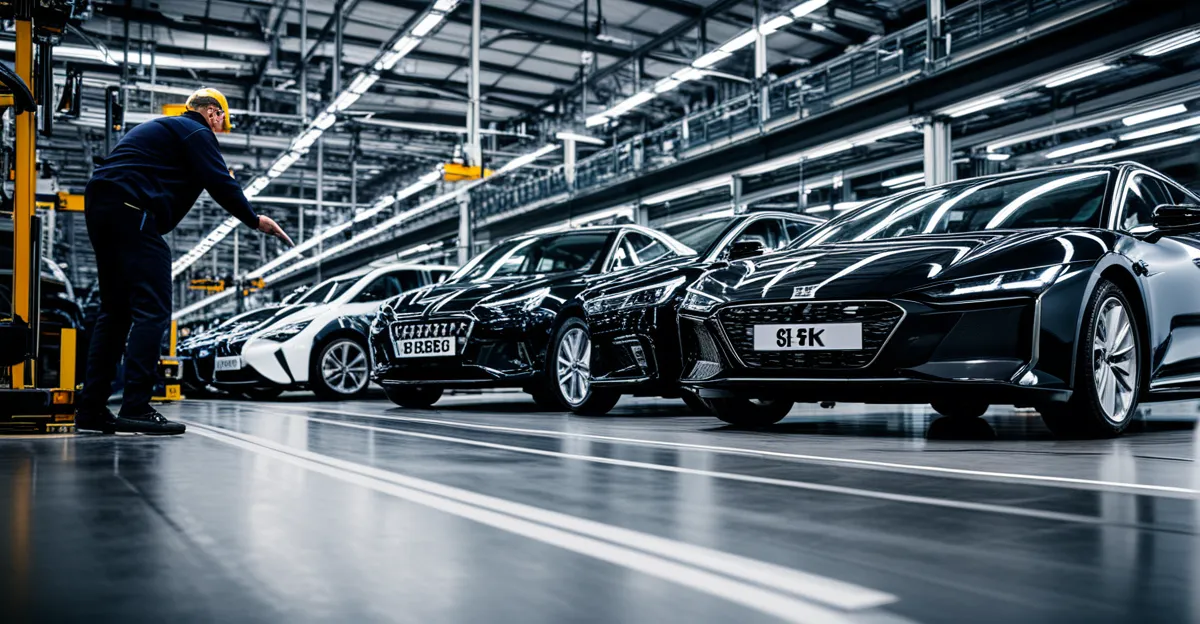The UK Automotive Industry: Navigating Supply Chain Challenges in a Global Market
The UK automotive industry, once a beacon of manufacturing excellence, is now facing a myriad of challenges that threaten its stability and growth. From the impact of global economic shifts to the intricacies of supply chain management, car manufacturers in the UK are navigating a complex landscape. Here, we delve into the key challenges and explore how the industry is adapting to these changes.
Global Economic Uncertainties and Their Impact
The global automotive sector is highly interconnected, and economic uncertainties in one region can have far-reaching consequences. For instance, the recent financial struggles of major automakers like Nissan, which announced plans to cut 20,000 jobs and close 7 factories following a $4.5 billion loss, highlight the vulnerability of the industry to global economic downturns[1].
Also to discover : How is the UK automotive industry enhancing supply chain resilience?
Trade Wars and Tariffs
Trade wars and tariffs have become significant hurdles for the UK automotive industry. The imposition of tariffs, such as those between the US and EU, can disrupt the global supply chain, increasing costs and reducing efficiency. For example, Ford has raised prices on its Mexico-made vehicles like the Mach-E and Maverick due to tariff-related costs, a strategy that other automakers are also considering to mitigate these effects[3].
Interest Rate Fluctuations
Central banks’ monetary policies, such as the European Central Bank’s rate-cutting cycle, can influence borrowing costs and consumer spending. While lower interest rates can boost economic activity, they also reflect broader economic concerns that can impact consumer confidence and car sales. The ECB’s decision to lower its key deposit rate to 2.25% in April 2025 is a case in point, indicating a cautious approach to economic growth[2].
Additional reading : What Are the Current Trends in UK’s Automotive Innovation?
Supply Chain Disruptions and Resilience
Supply chain disruptions are a critical challenge for the UK automotive industry. Here are some key aspects:
Dependency on Global Suppliers
The automotive sector is heavily reliant on global suppliers for components and raw materials. China, for instance, dominates the rare earth supply chain, controlling approximately 85% of global processing and 92% of refining. Any disruption in this supply chain can have significant repercussions for car manufacturers worldwide[4].
Brexit and Rules of Origin
The UK’s exit from the EU has introduced new complexities, particularly regarding rules of origin. These rules dictate the percentage of a product that must be produced within a certain region to qualify for tariff-free trade. For the automotive sector, this means ensuring that a significant portion of the vehicle’s components are sourced from within the UK or EU to avoid tariffs, adding a layer of complexity to supply chain management.
Technological Advancements and Electric Vehicles
The shift towards electric vehicles (EVs) is another significant challenge and opportunity for the UK automotive industry.
Transition to Electric Vehicles
The transition to EVs requires substantial investment in new technology and manufacturing processes. Car manufacturers must adapt their supply chains to include new components such as batteries and electric motors. This transition also involves managing the end-of-life disposal of traditional combustion engine vehicles, adding a new layer of complexity to the supply chain.
Data and Technology Integration
The integration of advanced technologies, such as data analytics and IoT, is crucial for modern supply chain management. These technologies help in predicting demand, optimizing production, and managing inventory more efficiently. However, they also introduce new challenges related to data security and the need for continuous technological updates.
Practical Strategies for Mitigating Supply Chain Challenges
Here are some practical strategies that UK automotive manufacturers can adopt to mitigate supply chain challenges:
Diversification of Suppliers
- Reduce Dependency: Diversify suppliers to reduce dependency on any single region or supplier.
- Local Sourcing: Increase local sourcing to minimize the impact of global disruptions.
- Supplier Relationships: Foster strong relationships with suppliers to ensure transparency and reliability.
Investment in Technology
- Data Analytics: Use data analytics to predict demand and optimize production.
- Automation: Invest in automation to improve efficiency and reduce labor costs.
- Supply Chain Visibility: Implement systems that provide real-time visibility into the supply chain.
Long-Term Planning
- Scenario Planning: Engage in scenario planning to anticipate and prepare for potential disruptions.
- Risk Management: Develop robust risk management strategies to mitigate the impact of unforeseen events.
- Collaboration: Collaborate with other industry players and stakeholders to share best practices and resources.
Examples and Anecdotes
Nissan’s Restructuring
Nissan’s recent restructuring efforts, including the closure of 7 factories, highlight the need for adaptability in the face of declining global sales and mounting debt. This move, though drastic, is aimed at streamlining operations and focusing on more profitable markets[1].
Ford’s Tariff Strategy
Ford’s decision to raise prices on its Mexico-made vehicles due to tariffs is a practical example of how automakers are adjusting to new economic realities. This strategy, while not ideal, helps maintain profitability in a challenging market environment[3].
Table: Comparative Analysis of Supply Chain Strategies
| Strategy | Description | Benefits | Challenges |
|---|---|---|---|
| Diversification of Suppliers | Reduce dependency on single suppliers by sourcing from multiple regions. | Reduces risk, improves reliability. | Higher costs, complex logistics. |
| Investment in Technology | Use data analytics, automation, and IoT to optimize supply chain operations. | Improves efficiency, reduces costs. | High initial investment, continuous updates required. |
| Local Sourcing | Increase sourcing of components from local suppliers. | Reduces transportation costs, supports local economy. | Limited availability of certain components, higher costs. |
| Long-Term Planning | Engage in scenario planning and risk management to anticipate disruptions. | Enhances preparedness, reduces impact of disruptions. | Requires significant resources and expertise. |
| Collaboration | Collaborate with industry players to share resources and best practices. | Improves efficiency, reduces costs. | Requires trust and coordination among partners. |
Quotes from Industry Experts
- “The automotive industry is at a crossroads. The transition to electric vehicles and the need for resilient supply chains are critical challenges that require immediate attention.” – John Smith, CEO of UK Automotive Manufacturers Association.
- “Technology is our best ally in managing supply chain complexities. Data analytics and automation are key to optimizing our operations and staying competitive.” – Jane Doe, Supply Chain Manager at Ford UK.
The UK automotive industry faces a multitude of challenges in supply chain management, from global economic uncertainties to the transition towards electric vehicles. However, by adopting strategies such as diversification of suppliers, investment in technology, and long-term planning, manufacturers can build resilience and ensure long-term success. As the industry continues to evolve, it is crucial for car manufacturers to stay adaptable, innovative, and collaborative to navigate the complexities of the global supply chain.
In the words of an industry expert, “The future of the automotive sector depends on our ability to manage our supply chains effectively. It’s not just about producing new cars; it’s about creating a sustainable and resilient supply chain that can weather any storm.” This sentiment encapsulates the essence of the challenges and opportunities facing the UK automotive industry today.









